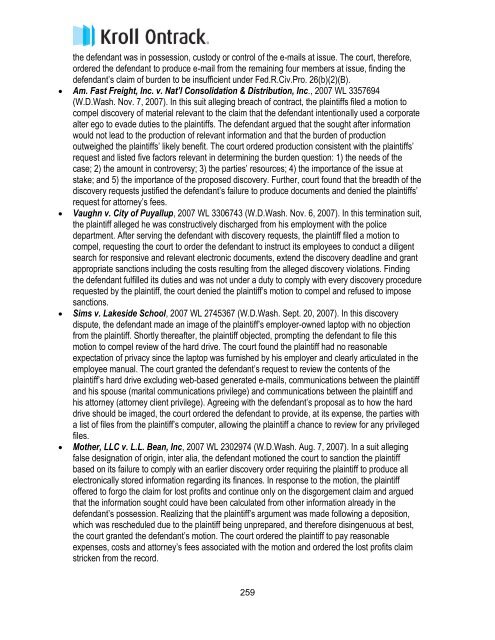Electronic Discovery and Computer Forensics Case List - Kroll Ontrack
Electronic Discovery and Computer Forensics Case List - Kroll Ontrack
Electronic Discovery and Computer Forensics Case List - Kroll Ontrack
Create successful ePaper yourself
Turn your PDF publications into a flip-book with our unique Google optimized e-Paper software.
the defendant was in possession, custody or control of the e-mails at issue. The court, therefore,<br />
ordered the defendant to produce e-mail from the remaining four members at issue, finding the<br />
defendant’s claim of burden to be insufficient under Fed.R.Civ.Pro. 26(b)(2)(B).<br />
� Am. Fast Freight, Inc. v. Nat’l Consolidation & Distribution, Inc., 2007 WL 3357694<br />
(W.D.Wash. Nov. 7, 2007). In this suit alleging breach of contract, the plaintiffs filed a motion to<br />
compel discovery of material relevant to the claim that the defendant intentionally used a corporate<br />
alter ego to evade duties to the plaintiffs. The defendant argued that the sought after information<br />
would not lead to the production of relevant information <strong>and</strong> that the burden of production<br />
outweighed the plaintiffs’ likely benefit. The court ordered production consistent with the plaintiffs’<br />
request <strong>and</strong> listed five factors relevant in determining the burden question: 1) the needs of the<br />
case; 2) the amount in controversy; 3) the parties’ resources; 4) the importance of the issue at<br />
stake; <strong>and</strong> 5) the importance of the proposed discovery. Further, court found that the breadth of the<br />
discovery requests justified the defendant’s failure to produce documents <strong>and</strong> denied the plaintiffs’<br />
request for attorney’s fees.<br />
� Vaughn v. City of Puyallup, 2007 WL 3306743 (W.D.Wash. Nov. 6, 2007). In this termination suit,<br />
the plaintiff alleged he was constructively discharged from his employment with the police<br />
department. After serving the defendant with discovery requests, the plaintiff filed a motion to<br />
compel, requesting the court to order the defendant to instruct its employees to conduct a diligent<br />
search for responsive <strong>and</strong> relevant electronic documents, extend the discovery deadline <strong>and</strong> grant<br />
appropriate sanctions including the costs resulting from the alleged discovery violations. Finding<br />
the defendant fulfilled its duties <strong>and</strong> was not under a duty to comply with every discovery procedure<br />
requested by the plaintiff, the court denied the plaintiff’s motion to compel <strong>and</strong> refused to impose<br />
sanctions.<br />
� Sims v. Lakeside School, 2007 WL 2745367 (W.D.Wash. Sept. 20, 2007). In this discovery<br />
dispute, the defendant made an image of the plaintiff’s employer-owned laptop with no objection<br />
from the plaintiff. Shortly thereafter, the plaintiff objected, prompting the defendant to file this<br />
motion to compel review of the hard drive. The court found the plaintiff had no reasonable<br />
expectation of privacy since the laptop was furnished by his employer <strong>and</strong> clearly articulated in the<br />
employee manual. The court granted the defendant’s request to review the contents of the<br />
plaintiff’s hard drive excluding web-based generated e-mails, communications between the plaintiff<br />
<strong>and</strong> his spouse (marital communications privilege) <strong>and</strong> communications between the plaintiff <strong>and</strong><br />
his attorney (attorney client privilege). Agreeing with the defendant’s proposal as to how the hard<br />
drive should be imaged, the court ordered the defendant to provide, at its expense, the parties with<br />
a list of files from the plaintiff’s computer, allowing the plaintiff a chance to review for any privileged<br />
files.<br />
� Mother, LLC v. L.L. Bean, Inc, 2007 WL 2302974 (W.D.Wash. Aug. 7, 2007). In a suit alleging<br />
false designation of origin, inter alia, the defendant motioned the court to sanction the plaintiff<br />
based on its failure to comply with an earlier discovery order requiring the plaintiff to produce all<br />
electronically stored information regarding its finances. In response to the motion, the plaintiff<br />
offered to forgo the claim for lost profits <strong>and</strong> continue only on the disgorgement claim <strong>and</strong> argued<br />
that the information sought could have been calculated from other information already in the<br />
defendant’s possession. Realizing that the plaintiff’s argument was made following a deposition,<br />
which was rescheduled due to the plaintiff being unprepared, <strong>and</strong> therefore disingenuous at best,<br />
the court granted the defendant’s motion. The court ordered the plaintiff to pay reasonable<br />
expenses, costs <strong>and</strong> attorney’s fees associated with the motion <strong>and</strong> ordered the lost profits claim<br />
stricken from the record.<br />
259

















